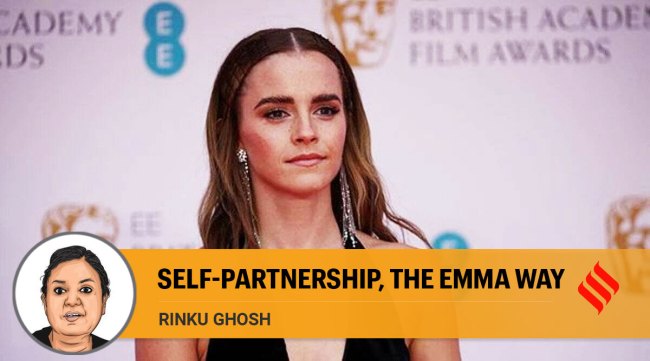Opinion Self-partnership, the Emma way
Some believe happy singletons magnify the misery of unhappily married couples. Some believe that twosomes look at singletons as a threat to a way of life they have copyrighted.
 For the young, it is the pressure to get married, settle down and have babies, neatly packaged as “finding a new direction in life.” (File)
For the young, it is the pressure to get married, settle down and have babies, neatly packaged as “finding a new direction in life.” (File) In times of political correctness, asking someone why she is still single may seem awfully blunt, especially if she is “established” enough. And even though actor Emma Watson proudly declared she is her own “partner”, single-shaming of an entire arc of women from 20 to 60 is still thriving.
For the young, it is the pressure to get married, settle down and have babies, neatly packaged as “finding a new direction in life.” For the 30-plus, it is still marriage, a live-in at least, that’s couched in some mushy words like “finding a fellow traveller who can share your achievements.” For those in their 40s, it is about “maturing like fine wine and sharing a cup with somebody”. As for those in their knotty 50s, the advisory is usually about “companionship for the leg of a journey that’s too long.” There’s one silver lining for the last argument though — they assume that you will live to be a grand dame till 90, without sickness and all health.
The new vocabulary is just an added chapter of a social project called “we need to make single women happy” without realising that they have self-evolved enough to be perfectly content on their own. So don’t be surprised if somebody is being overtly thoughtful and sensitive and trying a reverse psychology. For example, they might plan a singles weekend, leading you to believe that you are collectively having that rare commodity called fun. But know that they are still hoping to pair you with a like-minded soul, even setting up a date but making it look like a divine accident.
A single woman in the hood must mean she is broken-hearted, cheated upon, divorced, loveless, lonely and widowed, and, therefore, in need of a partner. No matter how well-meaning the friend, relative and well-wisher is, they collectively associate singledom with a dark, medieval tyranny and not the frothy lightness of being. And should you be living alone and happy, the same concern turns to intrusiveness: “What did she do over the weekend? Who is she going out with? Anybody visiting her?” Well didn’t they want you to be socially available in the first place. And if you are solo-tripping, gardening or doing pottery, you are dismissed as too self-absorbed and a lost case. In short, no matter what you do, happily-ever-after singledom is a problem.
Many psychologists have tried to analyse this phenomenon. Some believe happy singletons magnify the misery of unhappily married couples. Some believe that twosomes look at singletons as a threat to a way of life they have copyrighted. Whatever be the reason, the fact is, women have learnt to be happy with their own selves, be it by running marathons or being a couch potato binging on Netflix, and are economically empowered to make their own choices. According to the 2011 census, India has 72 million single women, the largest ever. And since the 2021 census was stalled by the pandemic, this number has surely shot up, enough to form a nation! This umbrella group comprises unmarried, divorced and widowed women as well as single mothers and bread-winners. Collectively, they have an economic heft that’s difficult to ignore.
In Japan, some studies show that one in seven women has not married till 50. The industry has reacted to this trend rather quickly, creating women-only urban spaces, karaoke salons and even apartment complexes. Imagine if such facilities were available to all single women in India, who find it difficult to rent an accommodation with owners looking at them as compulsive bohemians. In the US, 45 per cent of working women between the ages of 25 and 44 will be single by 2030. And if research by Morgan Stanley is to be believed, then single women spend more than the average household. What’s more, they make conscientious buys like EVs, enriching the green economy.
Yet they can’t always take advantage of schemes that apply to married people and pass it on to their family member or chosen beneficiary. Even luxury vacation packages are made for twosomes. Isn’t it time to look at the wholesome one?



